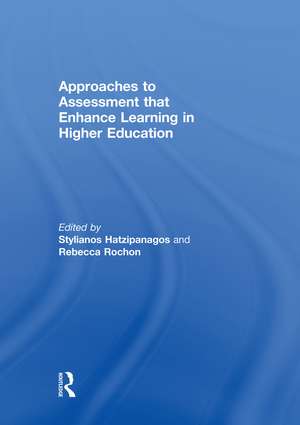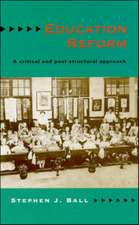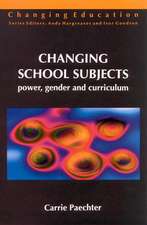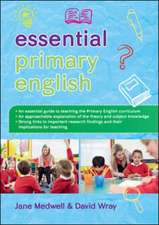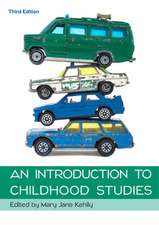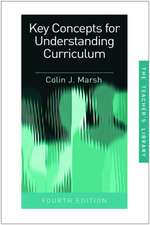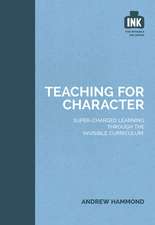Approaches to Assessment that Enhance Learning in Higher Education
Editat de Stylianos Hatzipanagos, Rebecca Rochonen Limba Engleză Paperback – 10 apr 2014
Contributors to this book have responded in different ways to the challenge of enhancing learning through assessment, offering reasons for the lack of focus on learning within assessment processes as well as suggesting possible solutions. The chapters demonstrate a balance between innovation and practicality, drawing on the underpinning theories. The result is both rich in discussion and an extremely useful resource for practitioners.
This book was originally published as a special issue of Assessment & Evaluation in Higher Education.
| Toate formatele și edițiile | Preț | Express |
|---|---|---|
| Paperback (1) | 329.13 lei 43-57 zile | |
| Taylor & Francis – 10 apr 2014 | 329.13 lei 43-57 zile | |
| Hardback (1) | 764.87 lei 43-57 zile | |
| Taylor & Francis – 11 aug 2011 | 764.87 lei 43-57 zile |
Preț: 329.13 lei
Preț vechi: 377.85 lei
-13% Nou
Puncte Express: 494
Preț estimativ în valută:
62.98€ • 65.93$ • 52.11£
62.98€ • 65.93$ • 52.11£
Carte tipărită la comandă
Livrare economică 07-21 aprilie
Preluare comenzi: 021 569.72.76
Specificații
ISBN-13: 9780415754743
ISBN-10: 0415754747
Pagini: 170
Dimensiuni: 174 x 246 x 10 mm
Greutate: 0.32 kg
Ediția:1
Editura: Taylor & Francis
Colecția Routledge
Locul publicării:Oxford, United Kingdom
ISBN-10: 0415754747
Pagini: 170
Dimensiuni: 174 x 246 x 10 mm
Greutate: 0.32 kg
Ediția:1
Editura: Taylor & Francis
Colecția Routledge
Locul publicării:Oxford, United Kingdom
Public țintă
Adult education, Postgraduate, and ProfessionalCuprins
1. Introduction: Approaches to assessment that enhance learning Stylianos Hatzipanagos and Rebecca Rochon 2. Reflections and new directions Paul Black and Robert McCormick 3. From monologue to dialogue: improving written feedback processes in mass higher education David Nicol 4. The impact of formative feedback on the development of academic writing Ursula Wingate 5. Beyond feedback: developing student capability in complex appraisal D. Royce Sadler 6. Exploring the use of peer assessment as a vehicle for closing the gap between feedback given and feedback used Patricia Cartney 7. A multi-faceted formative assessment approach: better recognising the learning needs of students James O. Jenkins 8. Non-traditional learners in higher education: comparison of a traditional MCQ examination with concept mapping to assess learning in a dental radiological science course David B. Hay, Po Li Tan and Eric Whaites 9. Beginning teacher education and collaborative formative e-assessment Mary Webb 10. Exploring formative e-assessment: using case stories and design patterns Caroline Daly, Norbert Pachler, Yishay Mor and Harvey Mellar 11. Complexity theory – an approach to assessment that can enhance learning and – more generally – could transform university management Lewis Elton
Notă biografică
Stylianos Hatzipanagos is the Head of eLearning at the King's Learning Institute, King's College London, UK. His research portfolio includes formative assessment and e-assessment, computer mediated communication and computer supported collaborative work, social software and social networking in an educational context. He has recently edited two books on social media and digital identities.
Rebecca Rochon is a Senior Lecturer at Buckinghamshire New University, UK, and part of the University’s Learning Development Unit. She is an active open and distance learning practitioner, and is heavily involved in the development and implementation of a variety of transitional programmes aimed at supporting entry into higher education.
Rebecca Rochon is a Senior Lecturer at Buckinghamshire New University, UK, and part of the University’s Learning Development Unit. She is an active open and distance learning practitioner, and is heavily involved in the development and implementation of a variety of transitional programmes aimed at supporting entry into higher education.
Descriere
This book addresses the need to diversify mainstream forms of assessment currently used in Higher Education in order to re-establish the focus on the learning process. Making assessment central to student learning is about returning to what current research emphasises: the primary beneficiary of assessment should be the student. To achieve this in the assessment context, students and tutors must engage in a process of dialogue and feedback. Authors respond in different ways to the challenge of enhancing learning through assessment, offering reasons for the lack of focus on learning within assessment processes as well as suggesting possible solutions. The chapters demonstrate a balance between innovation and practicality, drawing on the underpinning theories. The result is both rich in discussion and an extremely useful resource for practitioners. This book was originally published as a special issue of Assessment and Evaluation in Higher Education.
